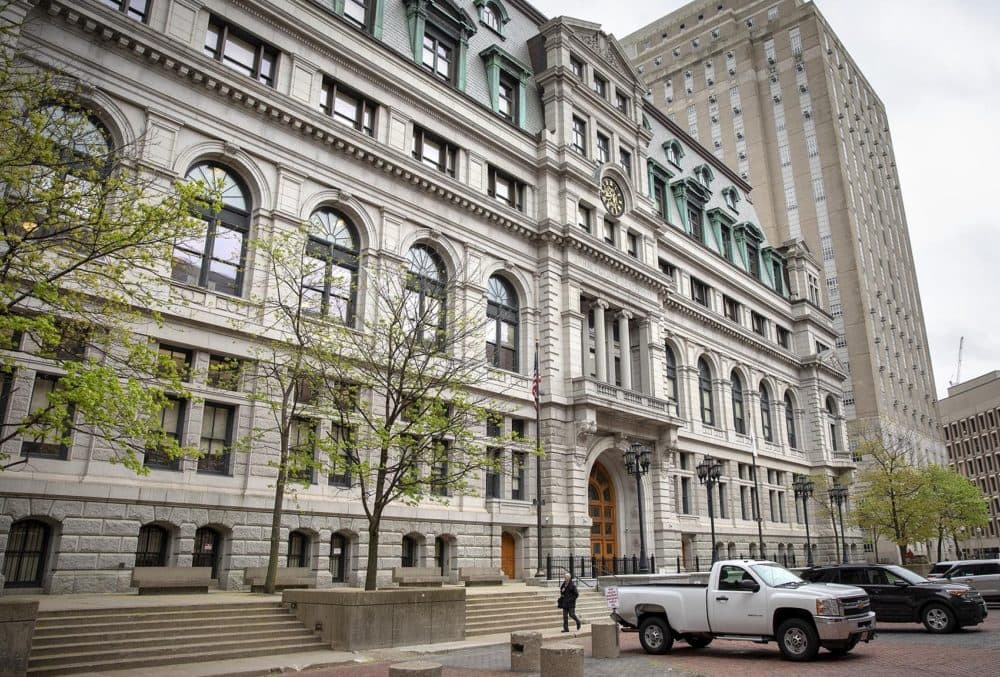Advertisement
SJC Says Courts Should Consider COVID Risks And Release More Prisoners

Massachusetts Supreme Judicial Court is sending a strong message about how courts should consider prisoners' requests for release because of the coronavirus pandemic. In a ruling involving two prisoners, the high court explicitly says the risk of the virus needs to weigh heavily in decisions about releasing those sentenced and appealing their convictions. The SJC approved both prisoners' requests for stays of their sentences.
"We transferred the cases here so that we could address a variety of issues concerning stays of sentences pending appeal, including, among others, the important and recurring question of how judges who are faced with requests for stays ought to weigh the COVID-19 pandemic as a factor in determining whether a stay is appropriate in any given case," Justice Elspeth Cypher wrote in the ruling.
One case involves Daniel Nash, who was convicted in 2018 on charges of raping a woman and recording the assault on his phone. In April of 2020, Nash sought a stay of his sentence while he appealed. A trial court judge first granted the stay, but it was reversed on appeal. The SJC ruling says the appeals court judge improperly cited low COVID case numbers in prisons in the reversal.
"Negative evidence of this type is not relevant because the COVID-19 situation changes so quickly, and because all inmates, even those who are young, healthy, and incarcerated at facilities that are relatively free of COVID-19, are subject to the general risk of infection that comes with their incarceration," the ruling reads.
The second case involves 64-year-old Joseph Elibert, who was convicted in January on two counts of indecent assault and battery on a person under 14. Elibert was granted a stay of his sentence and released on home confinement in April because of his age and underlying health issues. But an appeals court judge later revoked the stay citing the lack of new positive cases of the virus at MCI-Cedar Junction, where Elibert was to return to custody. Justice Cypher said Elibert's case "presents an example of how negative evidence of COVID-19 cases in a specific facility at a specific point in time can be misinterpreted or misused."
The ruling explicitly says that a goal for the courts should be to safely reduce the state's prison population.
"Recognizing the constitutional limitations on our authority, we must take such steps as are open to us to reduce the number of incarcerated individuals, and to protect those who remain incarcerated from the dangers of COVID-19 while at the same time protecting the safety of the public, the families of those who are released, and the individuals themselves," the ruling reads.
Defense attorneys say the ruling will likely affect a significant number of cases where prisoners are seeking release. Elibert's attorney, David Rangaviz, says hundreds of prisoners release requests have been denied, with judges often saying that a low number of positive COVID cases in a correctional facility means a low risk to prisoners.
"The SJC is basically telling trial courts across the Commonwealth that they should be releasing more people and that the risk is very real so we need to get more people out to improve public health both in the facilities and in the surrounding communities," Rangaviz said. "There have been very limited releases of sentenced prisoners and I hope this decision will lead to more."
Many of the trial court denials of prisoners' release requests cite data from the SJC. In April, the high court appointed a special master to issue weekly reports on the virus in prisons and jails. The reports include the number of active cases among prisoners and staff, the testing being done and the number of prisoner deaths. In Monday's ruling, the SJC warned lower courts against interpreting the special master's reports.
"The purpose of this critical monitoring, in other words, was to provide information and guideposts to the judiciary, as well as to the legislative and executive branches, during this unprecedented period, to allow informed decision making to best protect incarcerated individuals and staff within the various facilities, and to help identify and contain any outbreaks as quickly as possible. The intent was not to furnish evidence claimed to be determinative to disprove assertions of heightened risk from COVID-19 by incarcerated individuals, or to construct additional hurdles to overcome in order to obtain a stay," the ruling says.
The high court has been asked to weigh in on prisoner releases throughout the pandemic. In April, the court said those held pre-trial are eligible to seek release and urged the governor to use his clemency powers to reduce the prison population. The justices also clarified the legal procedures for sentenced prisoners seeking release. In June, the SJC said the state Department of Correction has the authority to release prisoners on home confinement.
